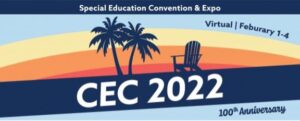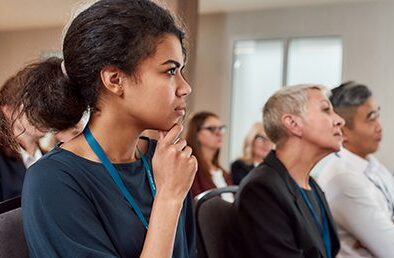This month, we highlight SRI Education’s participation in recent, current, and upcoming conferences. We’re excited to share our work on topics ranging from artificial intelligence and STEM and computer science research to promoting students’ well-being and successful transitions and improving outcomes for students with disabilities.
Read on for previews of what our researchers are sharing at conferences of the American Educational Research Association (AERA), Association for Public Policy Analysis & Management (APPAM), Society for Research in Child Development (SRCD), and more.
SRI presents research related to computer science instruction, game-based assessment, and student engagement in computational thinking

What do teachers need to better understand computer science concepts and instructional practices? At the SIGCSE technical symposium in early March, Satabdi Basu shared a position paper on designing standards-aligned resources and instructional supports for computer science teachers. Basu and Daisy Wise Rutstein will present on those resources at the AERA conference in April as well.
And at the ISLS annual meeting in June, Basu will present a poster on design considerations for an instrument to measure middle school computer science teachers’ pedagogical content knowledge.

How can a game-based assessment help teachers support and evaluate their students’ data literacy? In a structured poster session at AERA, Rutstein and Basu will discuss their design of “Beats Empire,” a formative assessment game that provides middle school teachers with information about their students’ understanding of data concepts.
Want to explore assessment technologies up close? Join Nonye Alozie, Ron Fried, and Mindy Hsiao at the NTSA conference in April for a hands-on workshop featuring assessment technologies for promoting collaboration in science classrooms.

What are some ways to nurture students’ computational thinking in real-world contexts? At the NARST International Conference in March, Rachmatullah is sharing a paper on how middle school students’ engagement with food web models impacted their computational thinking skills. And at ISLS, Basu will describe the design and implementation of the Water Runoff Challenge, a 3-week unit that integrates Earth science, engineering, and computational thinking.
Collaboration is key to student engagement in STEM learning, and SRI researchers have been studying this topic in depth. At ISLS, Alozie will present a validation study of a model and emergent observation rubric for collaboration, based on her National Science Foundation (NSF)-funded ACTIVITY and Internal Research and Development-funded Automated Collaboration Skills Assessment project. Rachmatullah will also be there to describe an analysis of students’ self-perception of participation and confidence in science, and how they contribute to collaboration quality.

And at the STEM for ALL Video Showcase in May, Nonye Alozie, Hui Yang, and Arif Rachmatullah will review data from NSF ACTIVITY on students’ self-confidence in science and how they take on and change roles when working in collaborative groups. Yang will also present findings on students’ role-changing patterns in small-group science tasks at the Learning at Scale (L@S) Conference in June. And at AERA, Alozie will discuss a poster on using behavioral analytics to characterize, assess, and provide feedback on how students work collaboratively in science-based learning activities.
SRI shares insights on children’s learning during the pandemic, the role of play in learning, and programs that promote kids’ well-being and transitions to new learning environments

How has the COVID-19 pandemic impacted learning for young children? Todd Grindal is co-chairing the education policy area at the APPAM conference in March, at which he is also chairing a hybrid panel on young children’s experiences across home and early care and education settings. As part of the panel, Jennifer Nakamura is sharing a study on how educators in Arkansas responded to state pandemic-related guidelines and the implications for children’s social-emotional development.
Children learn through play and imagination. But how does this process work? Sarah Gerard will offer some insight with two poster presentations at the SRCD special topic meeting Learning through Play and Imagination in April: “How Much Play in a Typical Preschool day? Time Use Data as Proxy” and “Developing Play-Based Hands-On Tasks to Assess Young Children’s Understanding of Science and Engineering.”

SRI researchers are also evaluating interventions focused on young students’ well-being. At the APBS conference in April, Carl Sumi, Michelle Woodbridge, and Kristen Rouspil will discuss findings about two student behavior intervention programs in urban elementary schools, one that fosters children’s social-emotional development and one that helps kids cope with traumatic experiences.

A networked approach can help students experiencing trauma. At the Carnegie Foundation Summit in March, Douglas Gagnon, Hannah Kelly, and Victoria Schaefer are describing a program that fosters collaboration among schools, first responders, and mental health providers to support children who may have experienced trauma.
What supports do children need as they move to new learning environments? At the Kindergarten Transition Policy Symposium in May, Howard Morrison will describe how the PDG B-5 TA Center helps children and families transition from early care to kindergarten and highlight the progress states have made in supporting their successful transitions.
SRI presents research on outcomes, transition, placement, and test-taking for students with disabilities

In case you missed it, at the CEC Convention & Expo in February, SRI presented a video about our work to improve outcomes for students with disabilities.
At APPAM, Grindal is chairing an in-person panel on the experiences of students with disabilities in and out of school. Topics will range from after-school care arrangements for children with disabilities to the effects of education spending on identifying children who may need special education services.
How can educators best support students with disabilities as they transition from secondary to higher education? In a roundtable session at AERA, Lynn Newman will share findings from a study of factors related to multilingual learners with disabilities accessing needed services at the postsecondary level.
Also at AERA, Adrienne Woods will join Pennsylvania State University researchers to discuss a study of factors related to elementary school students with disabilities being primarily placed outside of general education classrooms. The findings shed light on racial and ethnic disparities in special education placement.
What does the National Assessment of Educational Progress (NAEP) suggest about test-taking for students with disabilities? At the NCME conference in April, Xin Wei will explain how analyses of NAEP data revealed performance and response time patterns for students with autism spectrum disorder and students with learning disabilities.
But wait, SRI has more to share
At an SRCD special topic meeting on Construction of the ‘Other’ in May, Krystal Thomas will deliver a poster presentation on teacher discrimination and student engagement in the middle school classroom. Thomas’s research focuses on Black and Latinx students’ relational trust with their teachers and highlights how perceived discrimination can erode initial trust in teachers.
And here’s more of the great work SRI researchers will be presenting at the AERA annual conference:
- Howard Everson is presenting “Design and Methodology Issues in Learning-Based Assessments.”
- Ryan Grimm will discuss “Latent Transition Analysis for Intervention Students.”
- Patrik Lundh plans to talk about “The ‘Heart Work’ of Extended Education: Utilizing Compassion Organizing to Understand Responses in COVID.”
- Lundh will also present “The Soft Realities of Hard Policies: A Systems Study of After-School Continuous Quality Improvement.”
- Christopher Sanford will present on “Developing a Formal Assessment of Transition Skills for Students With Significant Cognitive Disabilities.”
- Carl Sumi and Maddie Cincebeaux will share “Impacts and Implications for Remote Data Collection in High School Classrooms.”
Stay up to date with our blogs



Join our team
Learn about education research and marketing career opportunities at SRI in early childhood, college and career pathways, digital learning, STEM and computer science, teaching quality and school reform, and data sciences, as well as other employment opportunities.
Apply at https://www.sri.com/careers/



